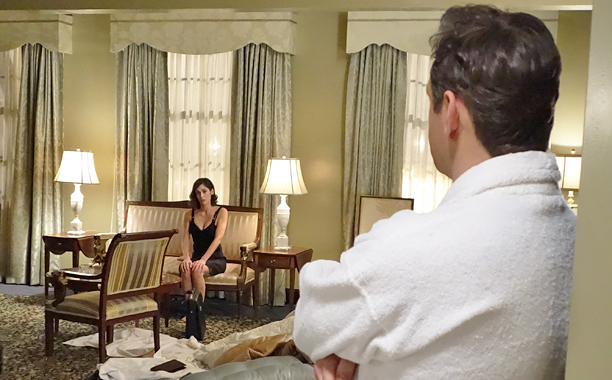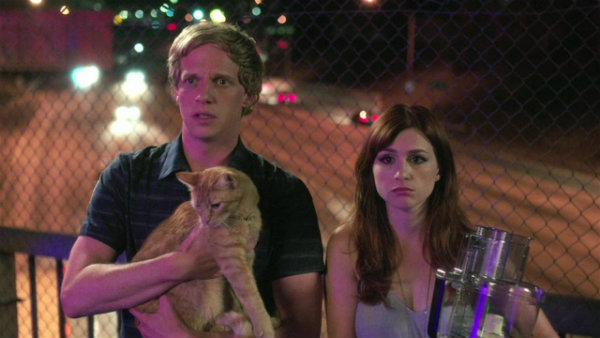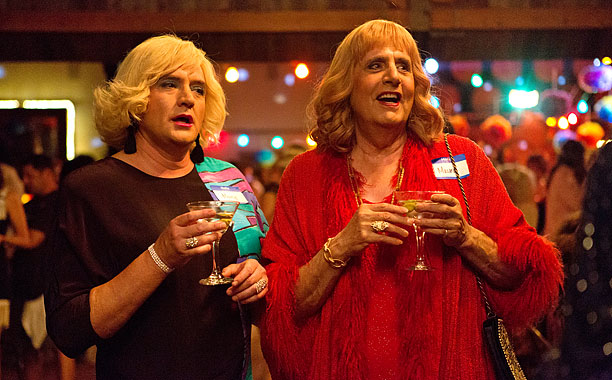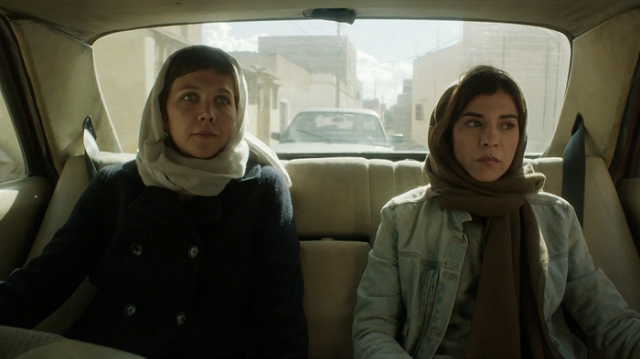In July, a panel of SoS TV editors and critics picked the best episodes of 2014 so far. Here are their picks for the best episodes of the second half of what has been another fantastic year for television.
The Honourable Woman, “The Empty Chair”
Written by Hugo Blick
Directed by Hugo Blick
Aired July 3, 2014
For anyone burnt out on Homeland‘s increasingly 24-esque take on international intrigue and perilous spycraft, Hugo Blick’s BBC/SundanceTV miniseries The Honourable Woman offers a respite, leaning harder on psychological and sociopolitical realism than overwrought action beats while tackling unrest in the Middle East and the repercussions of violence. Its first installment, “The Empty Chair,” is a case study in how to introduce both a complex story and complex characters without feeling like it’s needlessly dwarfing viewers in subplots just for the sake of it. Moreover, it works both as a sterling showcase for a very good Maggie Gyllenhaal, the unmistakable star of the series, as well as finding room for supporting players like Tobias Menzies, Lubna Azabal, and especially the great Stephen Rea as a classic Le Carré-esque weary spook. While a whole lot of series took pains to establish season-long mysteries this year, few did it as economically or as poetically as The Honourable Woman; throughout “The Empty Chair,” Blick is content to tease unknown traumas and revelations with the subtlest gestures, such as the creaking door that opens the series with an eerie calm, stripped of subtext. Other series could learn from the way Blick is able to communicate so much about Gyllenhaal’s wealthy philanthropist Nessa Stein through a wide variety of means beyond bald exposition. “The Empty Chair” is an expertly balanced hour: classy but not fussy, moving but not corny, serious but not ponderous. (Simon Howell)

The Leftovers, “Two Boats and a Helicopter” / “Guest”
Written by Jacqueline Hoyt and Damon Lindelof
Directed by Keith Gordon
Aired July 13, 2014
The SOS TV staff was deadlocked on which of The Leftovers’ most obvious standouts to choose from, and it’s not hard to see why. Both episodes hone in on a single player from the series’ ensemble, breaking away from the central Garvey clan. In “Two Boats and a Helicopter,” Christopher Eccleston takes center stage as the embattled Rev. Matt Jamison, who has made it his personal mission in life to convince the populace that the Sudden Departure was not the act of a Christian God, based on his own research into the seedy backgrounds of many who disappeared. “Two Boats” levels the two episodes that precede it, not only because it centers on Eccleston’s fiery performance, but because it finally sells viewers on the extreme levels of existential angst required to make this universe convincing. “Guest” pulls the same trick again to similarly stunning effect, this time even more decisively leaving behind the rest of the series by following Carrie Coon’s Nora Durst to NYC, where she finds herself the target of an identity thief. “Guest” also gives a boost to the series’ world-building, in this case by expanding the physical scope of the series’ universe and fleshing out some of the institutional frameworks that have sprung up in the wake of the Departure. More importantly, however, it weds the series’ compelling air of mystery and ephemeral tragedy to the character who has faced the most heartrending level of loss, and the results are naturally raw and devastating, though thankfully never completely hopeless. With news that the series’ second season will pare down the number of regulars from fourteen to six and change the locale, there’s reason to be optimistic that co-creators Damon Lindelof and Tom Perotta are leaning on the strengths showcased in these stellar episodes. (Simon Howell)

Masters of Sex, “Fight”
Written by Amy Lippman
Directed by Michael Apted
Aired July 27, 2014
Tell me if you’ve seen this before on TV: Two characters spend a night hashing out their personal histories and relationship with each other against the backdrop of a historic boxing match which is used as a visual metaphor throughout the hour. “Fight” may be a familiar, but it is still a masterclass in writing, directing, and acting. For a series that is often criticized for cramming too many storylines into a single episode, “Fight” takes a step back and allows its two leads to spend some quality time alone together in a room, a long night of the soul. And despite confining the majority of the running time to one small space, “Fight” is a rich episode that is a fabulous showcase for Carlie Sheen and Liz Caplan, full of memorable moments, clever dialogue, and detailed storytelling. In addition, the heartbreaking case of the Bombeck baby, born with two sex organs, conjures up Bill’s old childhood trauma and allows the writers to further explore manhood, as well as power dynamics – culminating in the series’ most devastating moment yet. If I had to choose, I would easily say this is the show’s best episode so far. (Ricky)

Garfunkel and Oates, “Speechless”
Written by Kate Micucci and Riki Lindhome
Directed by Fred Savage
Aired August 21, 2014
Television viewers who prefer comedy to drama might look back on 2014 as a landmark year for the decade, as it saw a ridiculous amount of fantastic new comedies hit the air. IFC’s Garfunkel and Oates, centered on the real-life comedy duo, was just one of those many impressive debuts, but it carved a wonderful niche for itself through its contagious tone and engaging lead performances from Riki Lindhome and Kate Micucci.
“Speechless” is a standout in the short first season (there are only eight episodes, so go watch all of them if you haven’t already). When the duo runs into a friend and his seemingly mute girlfriend, Riki and Kate decide to go on a double-date without speaking to see how long they can keep it up. The one date winds up turning into a series of dates with the two men and while “Speechless” is absolutely hilarious at points (especially when Kate realizes how her mannerisms make her seem like an adolescent or an adult suffering from a disorder), the episode also asks some interesting questions about the importance of speech and how we interpret (correctly and incorrectly) meaning based on gestures.
T.J. Miller steals a lot of the episode in his scenes as the orphan dating Riki, but it’s a spectacular half hour that also features one of the best songs of the whole season (“Sports Go Sports”). Garfunkel and Oates isn’t a series that needs to be viewed chronologically, so if you’re perusing this article and want to check out one of the comedies from this year that might have slipped by you, “Speechless” is the perfect place to start. (Sean Colletti)

BoJack Horseman, “Downer Ending”
Written by Kate Purdy
Directed by Amy Winfrey
Aired August 22, 2014
BoJack Horseman was the surprise hit of 2014. I went into this series with low expectations and found myself pleasantly surprised with how well it mixes crude humour with occasional deep meaningful insight. After the 10th episode left us with a surprising cliffhanger, episode 11 sees BoJack embark on a project in his typically gonzo style, leading to a drug-fueled revelation. “Downer Ending” has so many memorable moments, it’s impossible to list them all in one brief capsule review. Just a handful of the many highlights found in “Downer Ending”: Confessions from Todd; six hours playing with fonts; an overload of coffee and tequila; a series of mass hallucinations, including a gun battle; and an impromptu therapy session with a mash-up of Diane and Lucy from Peanuts. After days of binge-snorting and pill-popping, BoJack asks Diane if it’s too late for him. The heartwarming fantasy along with his harsh wake up call makes “Downer Ending” the best episode of BoJack Horseman season one. (Ricky)

Doctor Who, “Listen”
Written by Steven Moffat
Directed by Douglas Mackinnon
Aired September 13, 2014
The arrival of a new Doctor is always a major event in the Doctor Who universe, and there was a sizable hole to fill this year after the departure of fan favorite Matt Smith. Fortunately, not only was Peter Capaldi more than able to step into the role, he turned out to be an injection of energy that the series badly needed, producing an assured and entertaining season. “Listen” was a fantastic showcase for Capaldi, his quest to find out what’s lurking just out of sight focusing him into a man of frightening obsessions that stem from all-too-human emotions – proof that this Twelfth Doctor is a far cry from his more boyish and approachable predecessors. And “Listen” succeeds on many levels beyond that. It’s arguably the most terrifying episode of Doctor Who since season three’s “Blink,” playing masterfully off fears of the unknown and preserving its ambiguity. It lays the groundwork for the season-long relationship between Jenna Coleman’s Clara and Samuel Anderson’s Danny, using the actors’ chemistry to create an endearingly awkward first date and later making them a pairing that ripples through timelines past and present. It furthered the season’s welcome redevelopment of Clara Oswald as a character while at the same time tying her ever closer to the Doctor’s past, going all the way back to being simultaneously his greatest childhood fear and the seed of his courage. “Listen” is a victory on emotional, psychological, and mythological grounds, and a welcome sign that Steven Moffat and Capaldi are steering the venerable Doctor Who franchise in the right direction. (Les Chappell)

You’re The First, “Fist and Feet and Stuff”
Written by Stephen Falk
Directed by Matt Shakman
Aired September 18, 2014
The best romantic comedy of the last decade or so didn’t hit your local multiplex; it was the first season of FXX’s You’re the Worst, a gleefully vulgar take on age-old rom-com tropes blessed with a charming cast and a wounded heart. “Fists and Feet and Stuff” is the YtW take on the standard rom-com finale, in which all parties converge and the appropriate couplings are solidified. While “Fists and Feet” does clarify that Jimmy and Gretchen are ready to make a genuine stab at caring for each other, it leaves virtually everyone else in a total shambles, most memorably Kether Donohue’s Lindsay, whose marriage to her dorky but well-meaning husband Paul collapses, inspiring a tender rendition of Kate Bush’s “This Woman’s Work” (always a good addition to any finale – see also, Extras). The most subversive aspect of YtW isn’t its vulgarity, it’s its dual recognition that while the vast majority of relationships are doomed to collapse, it’s folly to deny genuine human connection. That dissonance is all over “Fists and Feet,” which manages to depict two very damaged people taking the leap with their fingers still crossed. That it accomplishes this while also making us care about the figures on the periphery (particularly Paul, as well as Lindsay’s wrecked sister Becca) and teasing heartache to come is just icing. (Simon Howell)

Transparent, “Best New Girl”
Written by Bridget Bedard
Directed by Jill Soloway
Aired September 26, 2014
Although its very much the story of a man becoming a woman, Transparent’s wonderful, touching, occasionally surrealist first season is also a story about family and how difficult it can be to grow within the same family unit that created you, that molded you into a singular image you find yourself trying to shed your entire adult life. It’s a show about siblings, sexuality, and self-discovery, and it’s all highlighted by “Best New Girl”, another fantastic flashback episode in a year full of them. Set during the day of Ali’s non-Bat Mitzvah, “Best New Girl” is a moving look at opportunity, reflection, and disappointment, drawing connections from the bottom of the family chain (Ali, whose immaturity is only matched by her parent’s selfishness in letting her cancel her Bat Mitzvah) to Mort himself, in his first adventure into the world of trans-camp (accompanied by Bradley Whitford, who mesmerizes in his shining moment in this episode as Maura’s very, very conflicted male friend, Marcy). Underlined by the ugliness of self-centered journeys, “Best New Girl” is a beautiful, weird, heartwarming, and tragic half-hour of television, one that gives vast depths to the stories of the past, present, and future of Transparent. (Randy Dankievitch)

The Knick, “Get the Rope”
Written by Michael Begler and Jack Amiel
Directed by Steven Soderbergh
Aired September 26, 2014
In “Get the Rope,” The Knick does an interesting thing with its racial politics. When the shit hits the fan, many of the characters who are firmly set in their prejudices are forced to put their differences aside in order to survive and withstand. The plot keeps things moving from one problem to the next and with many of the season-long tensions boiling, just about everyone has a moment to shine. “Get the Rope” is a stressful and chaotic hour that sees a mob destroy the exterior, and then the interior, of The Knick‘s main setting, the Knickerbocker Hospital, while seeking out misguided revenge. And yet surprisingly “Get the Rope” also shows the series’ softer side, as Cornelia and Algeron finally get their moment and Nurse Lucy Elkins makes her move on Thackery. “Get the Rope” doesn’t do anything we haven’t seen plenty of times before, but somehow The Knick finds a way to make it seem fresh. (Ricky)
Part One / Part Two / Part Three / Part Four / Part Five


